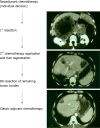Patient-centered developments in colon- and rectal cancer with a multidisciplinary international team: From translational research to national guidelines
- PMID: 35070066
- PMCID: PMC8727190
- DOI: 10.4240/wjgs.v13.i12.1597
Patient-centered developments in colon- and rectal cancer with a multidisciplinary international team: From translational research to national guidelines
Abstract
Rarely, scientific developments centered around the patient as a whole are published. Our multidisciplinary group, headed by gastrointestinal surgeons, applied this research philosophy considering the most important aspects of the diseases "colon- and rectal cancer" in the long-term developments. Good expert cooperation/knowledge at the Comprehensive Cancer Center Ulm (CCCU) were applied in several phase III trials for multimodal treatments of primary tumors (MMT) and metastatic diseases (involving nearly 2000 patients and 64 centers), for treatment individualization of MMT and of metastatic disease, for psycho-oncology/quality of life involving the patients' wishes, and for disease prevention. Most of the targets initially were heavily rejected/discussed in the scientific communities, but now have become standards in treatments and national guidelines or are topics in modern translational research protocols involving molecular biology for e.g., "patient centered individualized treatment". In this context we also describe the paths we had to tread in order to realize our new goals, which at the end were highly beneficial for the patients from many points of view. This description is also important for students and young researchers who, with an actual view on our recent developments, might want to know how medical progress was achieved.
Keywords: Colon- and rectal cancer; Interdisciplinary treatment; National guidelines; Personalized treatment; Translational research.
©The Author(s) 2021. Published by Baishideng Publishing Group Inc. All rights reserved.
Conflict of interest statement
Conflict-of-interest statement: The authors declare no conflict of interest.
Figures



References
-
- Link KH, Sagban TA, Mörschel M, Tischbirek K, Holtappels M, Apell V, Zayed K, Kornmann M, Staib L. Colon cancer: survival after curative surgery. Langenbecks Arch Surg. 2005;390:83–93. - PubMed
-
- Leitlinienprogramm Onkologie (Deutsche Krebsgesellschaft, Deutsche Krebshilfe, AWMF) S3-Leitlinie Kolorektales Karzinom, Langversion 2.1, 2019, AWMF Registrierungsnummer: 021/007OL. [cited 2 Feb 2021]. In: AWMF [Internet]. Available from: https://www.awmf.org/uploads/tx_szleitlinien/021-007OLl_S3_Kolorektales-... .
-
- Hohenberger W, Weber K, Matzel K, Papadopoulos T, Merkel S. Standardized surgery for colonic cancer: complete mesocolic excision and central ligation--technical notes and outcome. Colorectal Dis. 2009;11:354–64; discussion 364. - PubMed
-
- Liang Y, Li G, Chen P, Yu J. Laparoscopic vs open colorectal resection for cancer: a meta-analysis of results of randomized controlled trials on recurrence. Eur J Surg Oncol. 2008;34:1217–1224. - PubMed
Publication types
LinkOut - more resources
Full Text Sources

